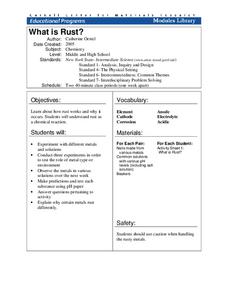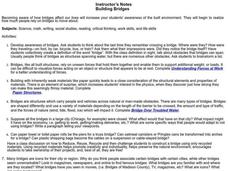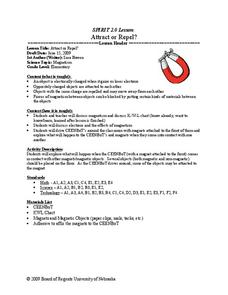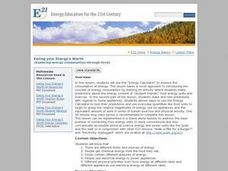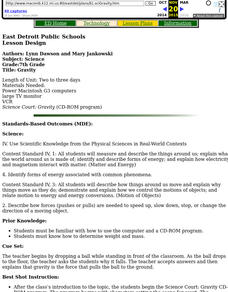Cornell University
What Is Rust?
Why do metals rust differently? Scholars experiment with metal combinations in a hands-on activity. They create unique environments with different metals and compare the rate and amount of rust for each.
Curated OER
Water Pressure Blaster
Third graders complete an experiment to introduce them to the concept of water pressure. In this water pressure lesson plan, 3rd graders create pressure in a water bottle and observe the force of water that is created.
Cornell University
Spectral Analysis with DVDs and CDs
Build a spectrometer to analyze properties of light. Scholars examine the spectrum from CDs and DVDs from two different light sources. Using the spectrum, they work to identify different elements.
Curated OER
Chemical Consequences of Burning Fossil Fuels
Future scientists are introduced to the chemical consequences of burning fossil fuels, learning that fossil fuel combustion leads to the formation of oxides of three nonmetals: carbon, nitrogen, and sulfur, all of which end up in the...
Curated OER
Solar Car Series: during What Part of the Day Can the Most Sun Power Be Collected?
In preparation for solar car races, middle schoolers attempt to discover what time of day the most solar energy can be collected. Begin by demonstrating the use of a voltmeter for measuring solar cell output. Take them outdoors to take...
Curated OER
Elements Commercials
Student teams use a digital camcorder and iMovie to create a commercial about an element. They also use the Internet and their textbook to gather the following information about their element: the name, the symbol, the atomic number, the...
Curated OER
Building Bridges
Provide a comprehensive exploration of bridges and civil engineering. First, learners discuss the different types of bridges. Then, they identify the characteristics of a suspension, beam, and arch type of bridge. In addition, they learn...
Curated OER
Ohm's Law
If your future physicists know how to construct simple circuits, include resistors, and use a multi-meter to measure voltage, then you might employ this lesson on Ohm's law. Each lab group investigates the relationships among voltage,...
Curated OER
Off the Grid
Learners examine the advantages and disadvantages of renewable and non renewable energy sources. In this engineering lesson students explain what it means for a house to be "off the grid".
Curated OER
Reversible and irreversible changes
Students define the words "reversible" and "irreversible." They complete a worksheet that shows a number of changes. Students must decide which are reversible and which are irreversible.
Curated OER
Magneto-hydrodynamic Drives
Students examine how electric and magnetic fields can be used to force water out of a chamber to move a vehicle forward.
Curated OER
Attract or Repel?
Students explain why some objects attract and some do not. For this physics lesson, students investigate the magnetic properties of objects using CEENBoT. They give some important applications of magnets.
Curated OER
Wind Power! 2
Fourth graders explore how engineers transform wind energy into electrical energy by building their own miniature wind turbines and measuring the electrical current it produces. They see how design and position affect the electrical...
Curated OER
Wind Power
Fourth graders develop an understanding of how engineers use wind to generate electricity. They will build a model anemometer to better understand and measure wind speed. They discover that engineers design wind turbines that generate...
Curated OER
Lemon Batteries Revised
Fifth graders investigate how chemical energy in food and batteries is potential or stored energy. They discuss how batteries function, and create a class list of different forms of energy. Students then create a lemon battery that...
Curated OER
Creating a Simple Telegraph Machine
Students experiment and discuss circuits and how they work. In this science lesson, students construct a telegraph machine using cardboard, wires, battery, electric tape and masking tape. They investigate what happens as the circuits...
Curated OER
The Wonderful World of Waves (Wave Basics)
High schoolers define amplitude, wavelength, frequency, and period, calculate period given frequency, and calculate frequency given period, define crest and trough and locate both on diagram of wave, differentiate between latitudinal and...
Curated OER
The Historical Development of Magnetism
Students discuss the history and importance of magnets to the world. For this magnetism lesson, students write an essay of a world without magnets. Students may research addition information to add details about uses of magnets.
Curated OER
Maglev Trains
Students explore how Maglev trains work. In this technology lesson, students discuss the pros and cons of Maglev compared to conventional trains. They build a simple Maglev train model.
Curated OER
Eating your Energy's Worth
Students calculate the amount of electrical energy used in a week in food units. They create ways to reduce energy use. Students discuss the different forms and sources of energy. They discuss how people use electrical energy to power...
Curated OER
Powering a Green Earth
Students compare and contrast renewable and nonrenewable energy. In this environmental science instructional activity, students discuss the importance of going green. They identify the different components in a power grid system.
Curated OER
Circuit City
Fifth graders are introduced to the concept of circuits and how electricity works. In groups, they design their own subdivision with houses in which they have inside and outside light sources. To end the lesson, they make the circuits...
Curated OER
Global Warming – More or Less
Eighth graders identify the factors that contribute to global warming. In this earth science lesson, 8th graders evaluate the impact of global warming on the planet. They discuss their views within the group.
Curated OER
Gravity
Seventh graders progress through the Science Court: Gravity CD-ROM program. They read about and discuss how gravity was discovered. They complete review worksheets in preparation for the test.


